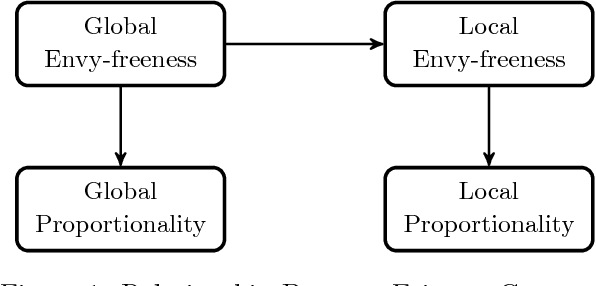Fair Division via Social Comparison
Paper and Code
Feb 25, 2018


In the classical cake cutting problem, a resource must be divided among agents with different utilities so that each agent believes they have received a fair share of the resource relative to the other agents. We introduce a variant of the problem in which we model an underlying social network on the agents with a graph, and agents only evaluate their shares relative to their neighbors' in the network. This formulation captures many situations in which it is unrealistic to assume a global view, and also exposes interesting phenomena in the original problem. Specifically, we say an allocation is locally envy-free if no agent envies a neighbor's allocation and locally proportional if each agent values her own allocation as much as the average value of her neighbor's allocations, with the former implying the latter. While global envy-freeness implies local envy-freeness, global proportionality does not imply local proportionality, or vice versa. A general result is that for any two distinct graphs on the same set of nodes and an allocation, there exists a set of valuation functions such that the allocation is locally proportional on one but not the other. We fully characterize the set of graphs for which an oblivious single-cutter protocol-- a protocol that uses a single agent to cut the cake into pieces --admits a bounded protocol with $O(n^2)$ query complexity for locally envy-free allocations in the Robertson-Webb model. We also consider the price of envy-freeness, which compares the total utility of an optimal allocation to the best utility of an allocation that is envy-free. We show that a lower bound of $\Omega(\sqrt{n})$ on the price of envy-freeness for global allocations in fact holds for local envy-freeness in any connected undirected graph. Thus, sparse graphs surprisingly do not provide more flexibility with respect to the quality of envy-free allocations.
 Add to Chrome
Add to Chrome Add to Firefox
Add to Firefox Add to Edge
Add to Edge